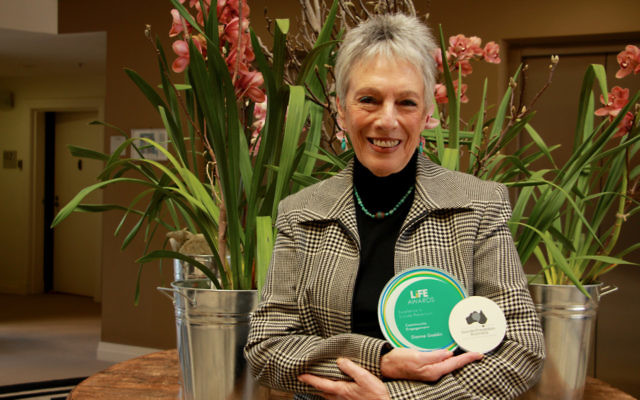Fighting to prevent suicide
“Suicide is not the answer – we have to never give up hope and, as a society, we are all responsible.” Those are the powerful words of Dianne Gaddin, the winner of the community engagement (individual) category at the 2016 LiFE Awards.

“SUICIDE is not the answer – we have to never give up hope and, as a society, we are all responsible.”
Those are the powerful words of Dianne Gaddin, the winner of the community engagement (individual) category at the 2016 LiFE Awards, presented at the National Suicide Prevention Conference held in Canberra on July 26.
Gaddin, the recipient of a Medal of the Order of Australia (OAM) in January, has worked tirelessly as an advocate, volunteer and public speaker for suicide prevention since her daughter, Tracy, tragically took her own life at The Gap 11 years ago.
She serves in a voluntary capacity for organisations including the Black Dog Institute, JewishCare, Jewish House (as a crisis line operator) and the Eastern Sydney Suicide Prevention Network, and prides herself on being an activist for change – never missing an opportunity to raise pressing issues about suicide with state and federal politicians.
Gaddin told The AJN she feels “really humbled” to have won the prestigious national award and shared what continues to drive her.
She said while there have been significant improvements in awareness about suicide and mental health, and innovative programs are proving more effective in tackling the problem, the statistics on suicides in Australia “are horrendous and getting worse”.
In 2014 more than 2800 Australians died by suicide, almost double the national road toll.
“This is why I am still fighting – I feel you have to continue doing what you can until you get a -breakthrough.
“I don’t have all the answers, but for me it’s very important to generate awareness that it’s okay to say, ‘I’m not doing too well today.’
“By talking about the problem, you remove the stigma.”
Gaddin said one area that needs urgent improvement is ensuring that adequate assessment, management, monitoring and support is provided for patients released from in-care facilities and hospital mental health units, particularly within the first seven days.
“That [lack of monitoring and care] shouldn’t happen as they [medical staff] know the person is perhaps prone to suicide – so that is a national disgrace,” Gaddin said.
“I think it would be beneficial if this issue received more media coverage.”
Another area that needs to be put under the spotlight, Gaddin believes, is bullying on social media.
“I think Facebook has a lot to answer for – bullying occurs a lot on it to young kids, who are the most vulnerable to it.”
Gaddin said it is Suicide Prevention Australia’s goal to halve the number of suicides occurring each year.
SHANE DESIATNIK

comments